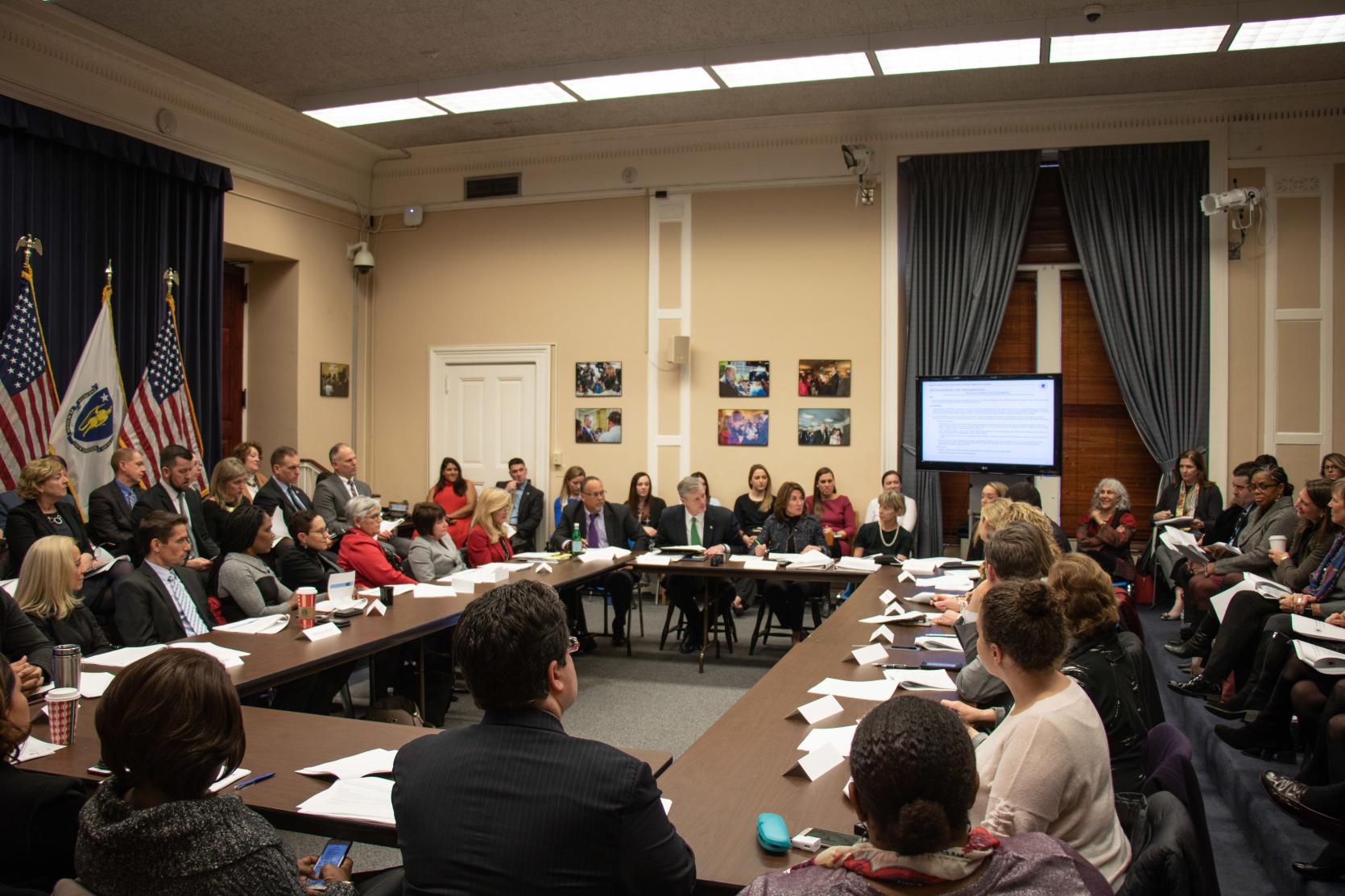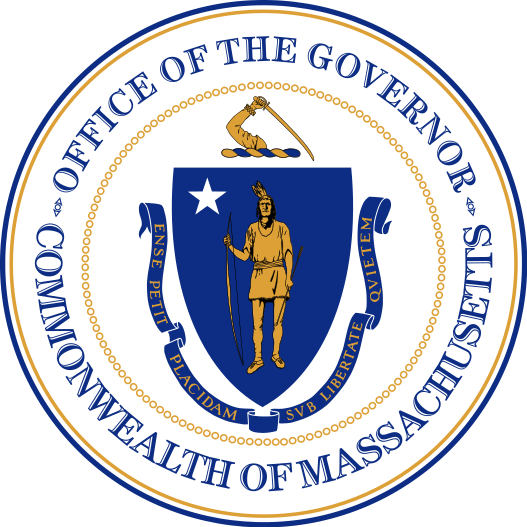- Office of Governor Charlie Baker and Lt. Governor Karyn Polito
- Governor's Council to Address Sexual Assault and Domestic Violence
- Governor's Press Office
Media Contact
Brendan Moss, Press Secretary, Governor's Office

BOSTON — Today, Governor Charlie Baker and Lt. Governor Polito, Chair of the Governor’s Council to Address Sexual Assault and Domestic Violence, released an end of term report highlighting goals, accomplishments and next steps for the Council. The Council was launched in April 2015 through Executive Order 563, to advise the Governor on how to help residents of the Commonwealth live a life free of sexual assault and domestic violence by improving prevention and enhancing support for individuals and families affected by sexual assault and domestic violence.
“As a Commonwealth, we must keep working to end domestic violence and sexual assault, and I applaud the Council for the strong recommendations in this report that will bring awareness to this issue,” said Governor Charlie Baker. “I thank Lt. Governor Polito for her leadership, outstanding work and dedication as chair of the Council.”
“I am proud of the progress the Council has made in challenging the tragic reality of sexual assault and domestic violence that so many individuals and families endure,” said Lt. Governor Karyn Polito. “I look forward to continuing to work with members of the Council to implement more strategies to prevent sexual assault and provide support services for survivors.”
In August 2016, the Council announced five work groups based on identified priorities – Assessment and Response; Child Trafficking; Military, Veterans and Families; Housing Stability and Self-Sufficiency; and Prevention and Education. In December 2017, Lt. Governor Polito announced a 2018 Action Plan and deliverables for each of the five Council work groups. The report released today details the 2018 accomplishments in partnership with the five work groups with a status update on all action items and provides an overview of the development of the first statewide public awareness campaign in almost 20 years which is expected to be launched in the Spring 2019.
Assessment and Response Work Group: Goals: Provide recommendations for a Law Enforcement Domestic Violence (DV) Toolkit pilot program and create guidelines/best practices for domestic violence high risk teams (including law enforcement, District Attorneys, and intimate partner abuse organizations). Accomplishments include:
- Developed domestic violence assessment and strangulation tools to be used by law enforcement on all domestic violence responses, which incorporate national best practices and align with Massachusetts statutes.
- Municipal Police Training Committee (MPTC) led the original pilot program with four communities—Greenfield, Foxboro, Quincy, and Woburn—in 2017. Worksheets were also imbedded into MPTC annual in-service trainings for veterans officers as well as the updated Domestic Violence Law Enforcement Guidelines.
- Identified opportunities for improvement resulting in the creation of the Toolkit; Toolkit includes DV Assessment Worksheet, Sample Memoranda of Understanding (MOU), Sample Roles and Responsibilities, Sample Policies and Procedures, and Strangulation Worksheet. The Toolkit expanded into Barnstable, Hampden, Berkshire, Norfolk, Worcester and Bristol Counties in October 2018.
- Completed Guidelines for Massachusetts’ 28 domestic violence High Risk Teams.
Next Steps: In partnership with the Executive Office of Public Safety and Security (EOPSS) and MPTC, coordinate attendance for Regional Chief’s meetings across Massachusetts to discuss the Toolkit in 2019 and determine the final draft of the guidelines and best practices for domestic violence High Risk Teams and establish a distribution process.
Child Trafficking Work Group: Goals: Research best practice child trafficking policies and programs across the United States and provide updates on the work of the Massachusetts Child Welfare Trafficking Grant (MACWTG); explore opportunities to expand Commercially Sexually Exploited Children (CSEC) training, policies, and practices to Department of Youth Services (DYS) and Department of Mental Health (DMH); improve and identify opportunities for collaboration between High Risk Unit and State Police Specialty Units under the new Massachusetts State Police (MSP) 5thDivision; identify opportunities to expand training in identification, response, and supports for CSEC cases. Accomplishments include:
- In partnership with the MACTWG and Northeastern University, Dr. Amy Farrell conducted research on best practices across the U.S. emphasizing child trafficking responses within state child welfare/protection systems due to an outgrowth of questions arising from the work of the grant.
- The Department of Youth Services (DYS) established an internal Human Trafficking Training and Policy Work Group with representation from each of the five regions of DYS operation. The Work Group is comprised of regional representatives with clinical, residential and community-based expertise with a specific interest in working on human trafficking issues and prior or current involvement in the Multi-Disciplinary Teams (MDT) and/or human trafficking- related activities in their regions. The Work Group also includes members of the DYS Executive Team (General Counsel) and Senior Staff (Director of Victim Services and Employee Support Services).
- The Department of Mental Health’s (DMH) Division of Child Youth and Family Services created an Internal CSEC Work Group comprised of staff from all five regions, representing a range of expertise and disciplines, including clinical social workers, a coordinator of family driven practice, and two child psychiatrists. All members of the Work Group have previously attended the “Understanding and Responding to the CSEC” training provided by My Life My Choice, which focuses on CSEC girls.
- A MSP Commonwealth Fusion Center (CFC) Intelligence Analyst has been assigned to assist the High Risk Victims Unit (HRVU); analysts can provide all types of specialized case support including toll analysis. Additionally, the HRVU works closely with the MSP Cyber Crime Unit regarding evidence extraction.
Next Steps: Transition stewardship of the various established MACWTG meetings over to Massachusetts Children’s Alliance (MACA) who will also be managing the Victim of Crime Act (VOCA) grant-funded CSEC Coordinators in each county. The DYS internal work group is working towards finalizing language for amended policies and establishing a training plan and schedule. The DMH internal work group will review the landscape analysis and full report of national research on Specialized Residential Placement for Child Trafficking by Northeastern University to identify interventions, responses and characteristics of specialized residential programs. Every County MDT and CSEC Steering Committee will have a DMH and DYS representative. The DMH internal work group will plan a Spring 2019 CSEC Conference for state agency and providers to educate staff about needs of CSEC, the availability of specialized resources and to share best practices. When the online training course is finalized, MSP HRVU will collaborate with MPTC to disperse the training to all law enforcement and plan a one-day training seminar for law enforcement in 2019.
Veterans, Military and Families Work Group: Goals: Have a military representative in attendance at annual trainings and meetings for civilian intimate partner abuse education programs and collaborate with the Office for Victims of Crime for technical assistance (OVC TTAC) in creating best practice military-civilian sexual assault and domestic violence training. Accomplishments include:
- As of October 2018, all four trainings were completed. The trainings were held in Springfield, Framingham, Chelmsford and at Otis Air Base.
- As of October 2018, all four Office for Victims of Crime Training and Technical Assistance Center (OVCTTAC) Training were completed
- Created Regional Resource Booklet to serve as a guide for updated contact information throughout the Commonwealth, which will better assist in supporting community collaborations. Each training attendee received a copy of the Regional Resource Booklet.
- Due to identified need for collaboration, military representatives from the Family Advocacy Program attended the annual Intimate Partner Abuse Education Program (IPAEP) meeting.
Next steps: The Department of Public Health will work with military representatives to ensure continued attendance at future IPAEP meetings, advance policies and procedures, and partner with military supports. The Work Group will discuss future collaboration amongst Departments within the Executive Office of Health and Human Services (EOHHS), EOPSS and Jane Doe, Inc. to explore opportunities for policy development, training and best practices, enhancing community collaborations and supports for military-affiliated survivors.
Housing Stability and Self-Sufficiency Work Group: Goals: Increase collaboration between sexual assault and domestic violence and shelter/housing systems and subsidized housing models to promote existing best practice solutions and expand housing options and review implementation of 2013 Violence Against Women Act (VAWA) Reauthorization. Accomplishments include:
- Department of Housing and Community Development (DHCD) and co-chairs began discussions surrounding collaborative summits as a possibility for 2019.
- DHCD included SADV-related questions in their program listening tours and internal work group efforts.
- MassHousing and local providers took the lead in conducting cross trainings regionally; there have been 6 trainings to date.
- MassHousing partnered with Citizens’ Housing and Planning Association (CHAPA) to include Violence Against Women Act (VAWA) Emergency Transfer Waiting List Preference information on MassAccess Affordable Housing Registry.
Next Steps: MassHousing is finalizing a VAWA Handbook for use by private and public housing providers and victims service providers and will incorporate the handbook in future trainings. MassHousing is planning regional resource forums for housing management staff to learn about domestic and sexual violence services and a conference in June.
Prevention and Education Work Group: Goals: Complete sexual and intimate partner violence prevention and awareness “Skills Chart” across educational sectors and develop plan for adoption and implementation. Accomplishments include:
- Compiled and reviewed existing research and resources both nationally and locally.
- Designed a skills chart with a focus on student skills, ranging from pre-kindergarten through higher education.
- Submitted the group’s final draft of Skills Chart to Council and the Executive Office of Education (EOE), who are currently editing the document.
Next Steps: EOE is currently reviewing the final draft of the Skills Chart.
Public Awareness Campaign Steering Committee: Goals: Gather a small panel of experts from around the Commonwealth to work with a vender to assist in developing an awareness campaign; identify the campaign’s target audience and resources for support; and assist in monitoring the quality of the project as it develops. Accomplishments include:
- In June 2018, Council’s Executive Director worked with EOHHS and DPH to draft a campaign timeline.
- DPH selected MORE Advertising, a female-led organization
- Members of the Public Awareness Campaign Steering Committee were selected in Fall 2018
- First official meeting with the Work Group and MORE Advertising was held on October 19, 2018
Next Steps: The Steering Committee will present research findings at the next meeting in January. The campaign will be launched by Spring 2019.
For the full report, click here.
The Council will further partner with the Baker-Polito Administration as implementation of these accomplishments continues and new initiatives develop.
The Council is chaired by the Lt. Governor, and membership consists of up to 30 individuals appointed by the Governor and Lt. Governor, plus more than 80 work group members. Council members represent advocacy organizations, direct service providers, criminal justice agencies, and reflect the state’s geographic and cultural diversity. The Secretaries of Health and Human Services, Housing and Economic Development, Public Safety and Security, Education, and Labor and Workforce Development each appoint staff members to the Council. The Governor and Lt. Governor appointed an Executive Director, who is responsible for the administrative functions of the Council, organizing work groups, and executing the Council’s responsibilities.
###
